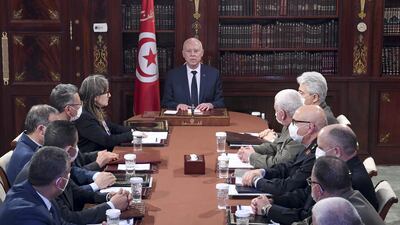Tunisia's President Kais Saied ruled out holding early elections after dissolving Parliament this week.
Mr Saied told Prime Minister Najla Bouden at a meeting late on Thursday that elections would not be held within the next three months, the president's office said in a post on Facebook.
The president issued a decree on Wednesday to dissolve Parliament, which he suspended last year, after it defied him by holding a session online and voting to repeal decrees that he used to assume near total power.
The Free Constitutional Party, an opposition party that polls project would be the biggest in Parliament if elections were held, urged Mr Saied to call early elections.
Abir Moussi, the party head and a supporter of autocratic former president Zine El Abidine Ben Ali, said that Mr Saied had no choice, according to the constitution, and should call elections within three months.
“I don't know how they get this interpretation,” Mr Saied said on Thursday, referring to article 89 of the constitution adopted in 2014 after the overthrow of Ben Ali in a popular uprising three years earlier.
He has previously said he will form a committee to rewrite the constitution, put it to a referendum in July then hold parliamentary elections in December.
Mr Moussi said on Friday that the party would boycott any referendum on political changes.
Tunisia's main opposition party, Ennahda, rejects the dissolution of Parliament and will boycott any referendum Mr Saied calls to restructure the political system unilaterally, its leader, Rached Ghannouchi, said on Thursday.
Mr Saied suspended Parliament last summer, brushed aside most of the 2014 constitution and moved to rule by decree as he set about remaking the political system. His opponents say the move amounts to a coup.
Tunisia's constitution says that Parliament must remain in session during any exceptional period of the kind announced by Mr Saied last summer and that dissolving the chamber should trigger a new election.
After a meeting with the head of Tunisia's powerful labour union on Friday, Mr Saied said there would be no single way to resolve Tunisia's political crisis.
He added that he refused to hold talks with those who tried to overthrow the state and "those who plundered the people's resources."
The leader of the Tunisian General Labour Union Noureddine Taboubi said that the union had agreed with Saied that there would be a partnership in outlining the future of Tunisia.

